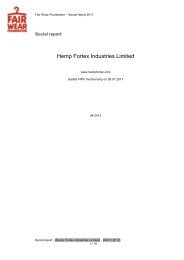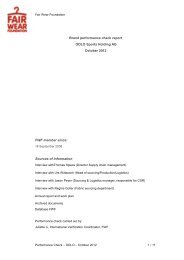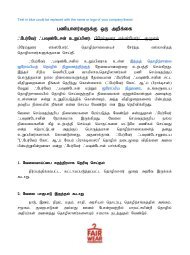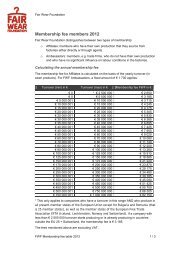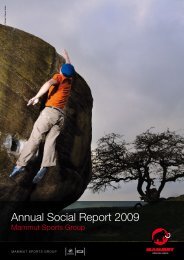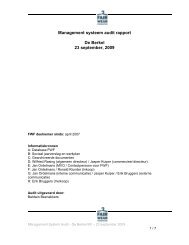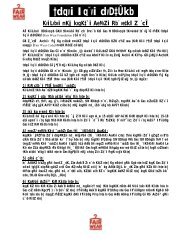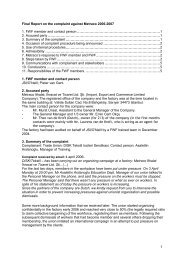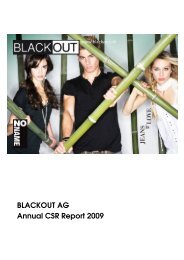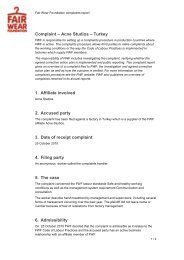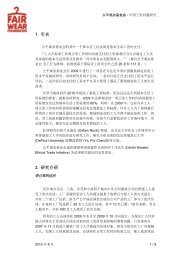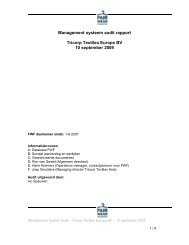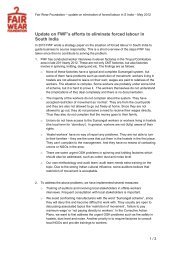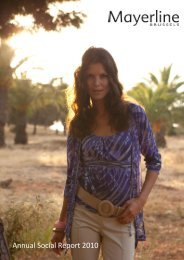Hessnatur - Fair Wear Foundation
Hessnatur - Fair Wear Foundation
Hessnatur - Fair Wear Foundation
Create successful ePaper yourself
Turn your PDF publications into a flip-book with our unique Google optimized e-Paper software.
4. HOW DO WE IMPLEMENT<br />
SOCIAL STANDARDS?<br />
Communication/<br />
Stakeholder dialogue<br />
− Communication/<br />
Stakeholder dialogue<br />
− FWF membership<br />
− Association work<br />
− Communication and<br />
exchange with suppliers<br />
− Round−tables<br />
− Social projects<br />
THE 3-PILLARED MODELL<br />
Verification &<br />
temporary assessment<br />
− Verification & tem−<br />
porary assessment<br />
− Supplier visits<br />
− Census of all pro−<br />
duction centres<br />
− Screens (internal)<br />
− Audits (external)<br />
COMMUNICATION NOTATION &<br />
ASSESSMENT<br />
14 hessnatur Social Report 2011/2012<br />
Implementation &<br />
continual cooperation<br />
− CAP implementation<br />
(Corrective Action Plan)*<br />
− Implementation<br />
of specific issues<br />
− Training seminars<br />
− Raising awareness<br />
of owners/manage−<br />
ment and employees<br />
in production sites<br />
MANAGEMENT &<br />
IMPROVEMENT<br />
*The “CAP” is a list of improvement measures which must be implemented in the facility.<br />
Together with the supplier, individual solutions are arranged for each respective facility.<br />
4.1 COOPERATION WITH<br />
HESSNATUR‘S SUPPLIERS<br />
4.1.1 hessnatur‘s suppliers<br />
Establishing stable, long−term partnerships<br />
forms the basis for our cooperation with our<br />
suppliers. 87 percent of hessnatur’s 83 sup−<br />
pliers have already been working together with<br />
hessnatur for longer than one year. In fact, 51<br />
percent of suppliers have worked together with<br />
hessnatur for 5 years or more. This is necessary<br />
in light of the fact that hessnatur‘s manufactur−<br />
ers are generally real experts in processing cer−<br />
tain natural fibres, such as silk, or in respect of<br />
individual product groups; sweaters, for examp−<br />
le, or socks, jackets or coats. Specific ecologi−<br />
cal and processing technology expertise is built<br />
up over years of cooperation. The maxim holds<br />
true for hessnatur: For us, skills and quality are<br />
more important to us than the lowest price.<br />
4.1.2 Selection of new suppliers<br />
Although we constantly strive to cooperate for<br />
the long term with our suppliers, sometimes a<br />
change to a dierent manufacturer is unavoi−<br />
dable. This might be because of our quality<br />
standards, for instance, or do to technical re−<br />
quirements or changes in the manufacturing<br />
range. Great care is taken when selecting new<br />
suppliers. Shared between the Executive Of−<br />
fice, the Purchasing Department, and Corpo−<br />
rate Responsibility, there is a clearly agreed<br />
upon guideline for suppliers, which stipulates,<br />
for instance, that we have products manufactu−<br />
red in certain countries only in conjunction with<br />
a corresponding social project (see Bangladesh,<br />
p. 27). As a general rule, facilities are visited<br />
by hessnatur sta before the cooperation be−<br />
gins with a new supplier, thereby ensuring that<br />
the manufacturer can meet hessnatur‘s quality,<br />
ecological and social requirements. A procedu−<br />
re coordinated by the Purchasing Department<br />
and Corporate Responsibility also comes into<br />
play. Among other things, this procedure sees<br />
to it that no initial production begins before the<br />
Corporate Responsibility team has inspected<br />
and approved the supplier.<br />
4.1.3 Cooperation with agents<br />
hessnatur collaborates with local agents in<br />
certain production countries – Turkey, Thai−<br />
land and Peru. They organize and monitor<br />
production on behalf of hessnatur and act as<br />
important contacts for the manufacturers. The<br />
agents therefore receive very intensive trai−<br />
ning focusing on the ecological and social re−<br />
quirements of hessnatur. This occurs both at<br />
hessnatur as well as on−site in the produc−<br />
tion facilities. Additionally, these agents work<br />
together particularly closely with the respec−<br />
tive hessnatur “experts” – Purchasing, Quali−<br />
ty Assurance and Corporate Responsibility.<br />
4.1.4 Suppliers and<br />
prduction countries<br />
In fiscal year 2011/2012, hessnatur worked with<br />
83 clothing suppliers entailing a total of 117 se−<br />
wing facilities. 52 percent of those production<br />
facilities are situated within EU member coun−<br />
tries. The number of suppliers is necessitated<br />
by the wide spectrum of products oered by hes−<br />
snatur, ranging from outer clothing for men, wo−<br />
men and children, to baby clothing and home<br />
textiles. Added to which, as already mentioned,<br />
some manufacturers specialize in certain natu−<br />
ral fibres or product groups. This specialization<br />
assures the high ecological and technological<br />
processing standards necessary for production.<br />
EU-COUNTRIES NON-EU-COUNTRIES<br />
Country No. of sewing facilities Country No. of sewing facilities<br />
Austria 1 Bangladesh 1<br />
Bulgaria 3 Belarus 1<br />
Czech Republic 7 Bosnia 1<br />
France 3 Brazil 1<br />
Germany 26 China 11<br />
Hungary 2 India 2<br />
Ireland 2 Croatia 2<br />
Italy 1 Macedonia 4<br />
Lithuania 4 Mongolia 1<br />
Poland 4 Nepal 2<br />
Portugal 3 Peru 8<br />
Romania 3 Thailand 3<br />
Scotland 1 Turkey 18<br />
Slovenia 1 Ukraine 1<br />
TOTAL 61 TOTAL 56<br />
Table 1: Number of sewing facilities per country of production, as of 27.09.2012<br />
4.1.5 Why don’t we only<br />
manufacture in Europe?<br />
hessnatur‘s cooperation with suppliers in criti−<br />
cal countries, such as China or Nepal, raises<br />
certain questions. Why do we not manufacture<br />
more in Europe? The reasons are various.<br />
Many “specialists” for processing certain fibres<br />
happen to be located in countries where these<br />
fibres are cultivated. For example, hessnatur<br />
mainly purchases garments from China that<br />
is made from indigenous fibres, such as silk,<br />
hemp, or precious hair, such as cashmere. Both<br />
cultivation and processing of these fibres are<br />
largely performed in China at this time; they<br />
are scarcely obtainable in other countries, and<br />
it is logical to keep the processing of these fib−<br />
res within a region of cultivation and expertise.<br />
Centres of competence for cotton processing,<br />
for example, are presently located in Turkey;<br />
for jersey and nightwear, in Germany and the<br />
Baltic region. At the same time, clothing manu−<br />
facturers, especially in Germany, are increasin−<br />
gly shutting down. Expertise is being lost. As<br />
such, there is no way of avoiding a further shift<br />
of production abroad, especially in light of the<br />
diverse range of products oered by hessnatur.<br />
In critical production countries, hessnatur con−<br />
ducts intensive screens of working conditions<br />
within facilities, chooses new suppliers meticu−<br />
lously, and commits itself to specific projects<br />
within those countries. hessnatur cooperates<br />
with Nepra e.V. in Nepal, for instance − a Ger−<br />
man association which cares for ostracised<br />
victims of leprosy. In the workshops of the Ne−<br />
palese partner association, New SADLE, lepro−<br />
sy victims and healthy employees work together,<br />
where they receive free medical care, child care,<br />
and educational opportunities. hessnatur sup−<br />
ported the enterprise in converting the hand−<br />
dying process to non−toxic dyes and schooled<br />
the facility in technical know−how for textile<br />
production. Moreover, we have textile products<br />
produced there every year for our collection,<br />
such as scarves or Pashmina−shawls, which are<br />
known for their exceptional quality and whose<br />
sales support the New SADLE project.<br />
hessnatur‘s inclusion<br />
of precious Pashmina−<br />
shawls fosters appre−<br />
ciation for the work<br />
of New SADDLE eV.<br />
workshops in Nepal.<br />
hessnatur Social Report 2011/2012 15



